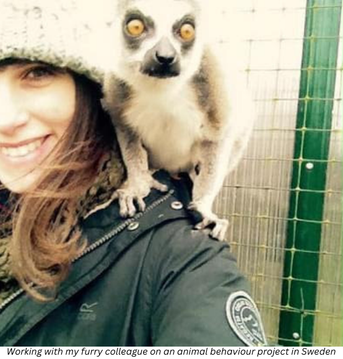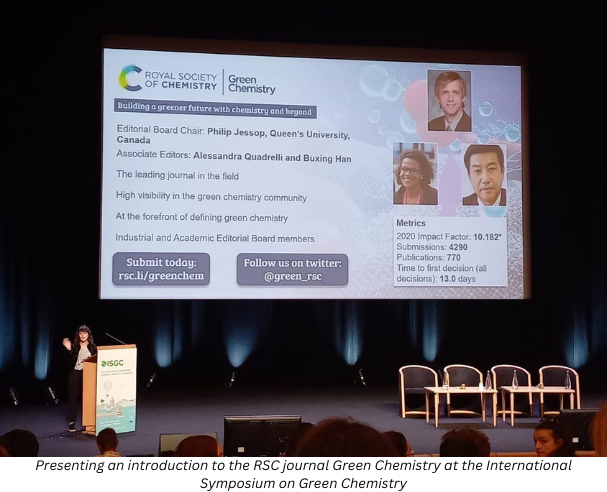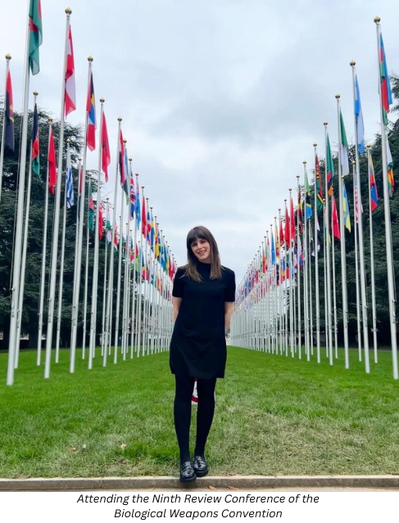Alexandra Klein, Research Assistant
ak2060@cam.ac.uk
Alexandra researches biological security at CSER, and is currently undertaking a PhD in Science, Technology, Engineering and Public Policy at University College London. Previously she worked in academic publishing as a Development Editor at the Royal Society of Chemistry. Alexandra holds a BSc (Hons) in Natural Sciences from University of Birmingham with a year abroad at Lund University, Sweden, and an MPhil in Biological Sciences from University of Cambridge.
Can you tell us about your pathway to CSER?
 My Bachelor’s degree was in the Department of Liberal Arts and Natural Sciences at the University of Birmingham, which is a really wonderful, inspiring course. It allowed me to pick modules from across the whole university and basically design a personalised degree programme. This encouraged my intellectual curiosity about lots of different subjects, and I like to think it made me into a much more interesting person! After this, I did an internship in Munich which ended with a symposium in Cambridge. I hadn’t visited Cambridge before and I fell in love with the city. I applied for a research Master’s degree here straight after visiting and I was accepted to join a lab in the Biochemistry department. Luckily when I moved to Cambridge I found it met all of my expectations; it’s a very inspiring place to live as an academic.
My Bachelor’s degree was in the Department of Liberal Arts and Natural Sciences at the University of Birmingham, which is a really wonderful, inspiring course. It allowed me to pick modules from across the whole university and basically design a personalised degree programme. This encouraged my intellectual curiosity about lots of different subjects, and I like to think it made me into a much more interesting person! After this, I did an internship in Munich which ended with a symposium in Cambridge. I hadn’t visited Cambridge before and I fell in love with the city. I applied for a research Master’s degree here straight after visiting and I was accepted to join a lab in the Biochemistry department. Luckily when I moved to Cambridge I found it met all of my expectations; it’s a very inspiring place to live as an academic.
After graduating I decided to go into the world of science publishing, and I applied for a job at the Royal Society of Chemistry. I learned a lot in my three years there and enjoyed working with scientists in the community; they are a lovely company to work for and have values which I really align with. Then I started to think about moving into policy, and after spending some time googling and reading about ‘science and public policy’ I saw a PhD programme at UCL which seemed to fit well with my interests and career goals. The department is called Science, Technology, Engineering and Public Policy, and the research there is focused on designing innovative solutions to society’s challenges. I seem to always be attracted to these kinds of interdisciplinary departments!

At a similar time to exploring this new interest in science policy, I had a very unexpected accident and ended up in hospital with serious injuries. I had already submitted my PhD applications before the accident, and when I heard that I had successfully gained funding through the UCL Research Excellence Scholarship it really motivated me to keep going during a very difficult time in my personal life. A few months later, as I prepared to start the PhD, I saw the Research Assistant job advertised at CSER and I felt like the two positions would perfectly complement each other. I’m so glad I decided to make this career change and take a step into the unknown! It felt a bit daunting to enter a different research field, but my team at CSER have been so welcoming and lovely to work with. It’s a great feeling to be inspired by my work and by the possibility of making a difference in this field.
Please can you tell us about your main area of expertise?
My main area of expertise is understanding and governing biological risks. I am also interested more broadly in policy making and decision making under uncertainty.
Please tell us about your current research at CSER?
My research at CSER focuses on the governance of biological risks, with a current focus on the recent refresh of the UK Biological Security Strategy. We are researching how this policy paper is being interpreted and implemented, as well as trying to understand how different expert communities are working together in the UK biosecurity space. I am also interested in the role of international cooperation in mitigating biological risks and attended the Ninth Review Conference of the Biological Weapons Convention last year.
For my PhD research, I am exploring how biotechnology came to be constructed as something that seems like a “threat” requiring governance. I am also interested in approaching the topic by thinking about decision making under deep uncertainty, and understanding how decisions and policies for biotechnologies are formed.

What drew you to your research initially and what parts do you find particularly interesting?
My starting point was reading about the history of bioweapons, and the state-sponsored biological weapons programmes during the twentieth century. I hadn’t heard much about them before and found it fascinating. This led me to read more about the risks and opportunities that come with advances in biotechnology, and other converging technologies. I read a book written by one of my PhD supervisors, Brian Balmer, called ‘Secrecy and Science. A Historical Sociology of Biological and Chemical Warfare’ and found it a great introduction to the history of biological weapons and culture of secrecy which surrounded it.
What are your motivations for working in Existential Risk?
It’s an important time to think about biological risks as regulations don’t always keep pace with advancing technology, and the convergence of biotechnology with other emerging technologies could be especially concerning. On the other hand, advances in biotechnology are also exciting and could provide a way to solve some of humanity’s greatest challenges. So it’s an interesting and complex topic to research, and through my PhD and work at CSER I hope I can make some contribution to the debates around governance.
For people who are just getting to grips with Existential Risk, do you have any recommendations for reading, people to follow or events to attend? etc.
For persuasive introductions to the field, I recommend Our Final Century by Martin Rees and The Era of Global Risk edited by some of my colleagues at CSER. For reading about risks and decision making, I really enjoyed Risk Savvy: How to Make Good Decisions by Gerd Gigerenzer.
Please provide links to where people can follow up/engage with you (e.g. Twitter/websites/blogs etc.).
I can be found on Twitter (@alexklein_) and LinkedIn. Also always happy to be emailed about any of these topics and interests.